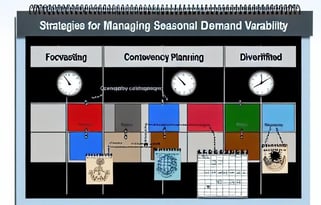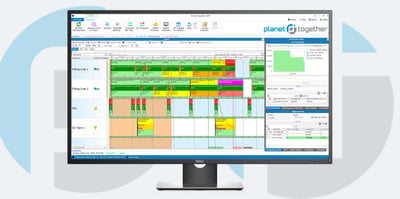Seasonal Demand Variability
In food and beverage manufacturing, one of the most significant challenges faced by production planners is navigating seasonal demand variability. Whether it's the holiday rush for confectionaries or the spike in demand for refreshing beverages during summer, seasonal fluctuations can significantly impact production schedules, inventory management, and overall operational efficiency.
However, with the right strategies and tools in place, production planners can effectively manage these fluctuations and optimize their manufacturing processes.

Understanding Seasonal Demand Variability
Seasonal demand variability refers to the fluctuation in consumer demand for products based on seasonal factors such as weather, holidays, cultural events, and trends. For food and beverage manufacturers, these variations can be substantial and may require adjustments in production schedules, inventory levels, and supply chain management practices.

Challenges Faced by Production Planners
Production planners are tasked with the crucial responsibility of balancing supply and demand while optimizing resource utilization and minimizing costs. However, seasonal demand variability presents several challenges that can complicate this process:
Forecasting Accuracy: Predicting demand accurately becomes challenging during peak seasons, as consumer behavior can be influenced by various factors. Fluctuations in demand can lead to overstocking or stockouts if not anticipated correctly.
Capacity Planning: Sudden spikes in demand require production facilities to ramp up production capacity quickly. However, this can strain resources and lead to bottlenecks in the production process if not managed efficiently.
Inventory Management: Maintaining optimal inventory levels is essential to meet customer demand while minimizing carrying costs. Seasonal fluctuations can disrupt inventory planning, leading to excess inventory or stockouts.
Supply Chain Coordination: Seasonal demand variability not only affects internal operations but also impacts the entire supply chain. Coordinating with suppliers, distributors, and logistics partners becomes crucial to ensure timely delivery of raw materials and finished goods.

Strategies for Managing Seasonal Demand Variability
To address these challenges effectively, production planners can implement the following strategies:
Data-Driven Forecasting: Leveraging advanced forecasting techniques and historical sales data can improve the accuracy of demand forecasts. Machine learning algorithms can analyze various factors influencing demand and generate more precise predictions.
Flexible Production Scheduling: Adopting agile production scheduling practices allows production planners to adjust schedules in real-time based on changing demand patterns. This flexibility enables them to optimize production capacity while meeting customer demand.
Inventory Optimization: Implementing inventory optimization tools helps production planners maintain optimal inventory levels throughout the year. These tools consider factors such as lead times, demand variability, and storage costs to determine the right stocking levels.
Collaborative Supply Chain Management: Establishing collaborative relationships with suppliers, distributors, and other partners enables seamless coordination across the supply chain. Real-time communication and visibility into inventory levels facilitate timely replenishment and minimize supply chain disruptions.

Integration with ERP, SCM, and MES Systems
In today's interconnected manufacturing landscape, integration between Production Planning software like PlanetTogether and ERP (Enterprise Resource Planning), SCM (Supply Chain Management), and MES (Manufacturing Execution Systems) platforms is essential for streamlining operations and enhancing efficiency.
PlanetTogether offers robust production planning capabilities, allowing production planners to create optimized production schedules based on demand forecasts, resource constraints, and production constraints. By integrating with leading ERP systems such as SAP, Oracle, Microsoft Dynamics, Kinaxis, Aveva, and others, production planners can achieve seamless data exchange and synchronization across various functions, including inventory management, procurement, and financials.
Benefits of Integration
Real-time Data Visibility: Integration enables real-time data exchange between production planning and ERP systems, providing production planners with accurate and up-to-date information on inventory levels, order status, and resource availability.
Automated Workflows: Integrated systems streamline workflows by automating routine tasks such as order processing, material procurement, and production scheduling. This reduces manual effort and improves operational efficiency.
Improved Decision Making: Access to comprehensive data insights enables production planners to make informed decisions regarding production schedules, inventory management, and resource allocation. This leads to better outcomes and optimized performance.
Enhanced Collaboration: Integration fosters collaboration across departments by facilitating data sharing and communication between production, procurement, and logistics teams. This improves coordination and ensures alignment with organizational goals.
Seasonal demand variability poses significant challenges for production planners in the food and beverage manufacturing industry. However, by adopting the right strategies and leveraging advanced production planning tools like PlanetTogether with ERP, SCM, and MES systems, production planners can effectively manage these fluctuations and optimize their manufacturing operations.
Integration with ERP, SCM, and MES systems further enhances efficiency by enabling seamless data exchange and collaboration across functions. By harnessing the power of technology and data-driven insights, production planners can navigate seasonal demand variability with confidence and achieve operational excellence in the ever-evolving market landscape.
Are you ready to take your manufacturing operations to the next level? Contact us today to learn more about how PlanetTogether can help you achieve your goals and drive success in your industry.
Topics: PlanetTogether Software, Integrating PlanetTogether, Efficient Resource Utilization, Data-Driven Forecasting and Scenario Planning, Enhanced Collaboration, Improved Forecasting Accuracy, Optimal Inventory Management, Food and Beverage Manufacturing




















LEAVE A COMMENT